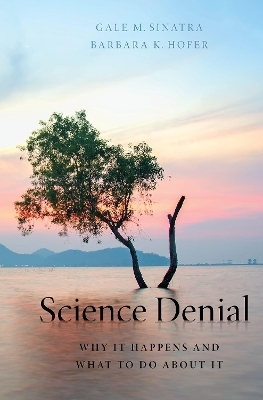
Science Denial
Oxford University Press Inc (Verlag)
978-0-19-094468-1 (ISBN)
How do individuals decide whether to accept human causes of climate change, vaccinate their children against childhood diseases, or practice social distancing during a pandemic? Democracies depend on educated citizens who can make informed decisions for the benefit of their health and well-being, as well as their communities, nations, and planet. Understanding key psychological explanations for science denial and doubt can help provide a means for improving scientific literacy and understanding—critically important at a time when denial has become deadly. In Science Denial: Why It Happens and What to Do About It, the authors identify the problem and why it matters and offer tools for addressing it. This book explains both the importance of science education and its limitations, shows how science communicators may inadvertently contribute to the problem, and explains how the internet and social media foster misinformation and disinformation. The authors focus on key psychological constructs such as reasoning biases, social identity, epistemic cognition, and emotions and attitudes that limit or facilitate public understanding of science, and describe solutions for individuals, educators, science communicators, and policy makers. If you have ever wondered why science denial exists, want to know how to understand your own biases and those of others, and would like to address the problem, this book will provide the insights you are seeking.
Gale M. Sinatra is the Stephen H. Crocker Professor of Education and Psychology at the Rossier School of Education at the University of Southern California, where she directs the Motivated Change Research Lab. She received her B.S., M.S., and Ph.D. in psychology from the University of Massachusetts, Amherst. She has been recognized by the American Educational Research Association for career achievements in research with the Sylvia Scribner Award. She resides in Altadena, California. Barbara K. Hofer is a Professor of Psychology Emerita at Middlebury College and is a Fellow of the American Psychological Association. She received her Ph.D. in psychology and education from the University of Michigan and an Ed.M. in human development from Harvard University. She is the recipient of national awards for both research and teaching, from the American Educational Research Association and the American Psychological Association. She lives in Middlebury, Vermont.
Preface
Section I: Science Denial, Doubt, and Resistance
1. What Is the Problem and Why Does It Matter?
2. How Do We Make Sense of Science Claims Online?
3. What Role Can Science Education Play?
Section II: Five Explanations for Science Denial, Doubt, and Resistance
4. How Do Cognitive Biases Influence Reasoning?
5. How Do Individuals Think About Knowledge and Knowing?
6. What Motivates People to Question Science?
7. How Do Emotions and Attitudes Influence Science Understanding?
8. What Can We Do About Science Denial, Doubt, and Resistance?
Index
| Erscheinungsdatum | 13.07.2021 |
|---|---|
| Verlagsort | New York |
| Sprache | englisch |
| Maße | 239 x 165 mm |
| Gewicht | 454 g |
| Themenwelt | Sachbuch/Ratgeber ► Natur / Technik |
| Geisteswissenschaften ► Psychologie ► Allgemeine Psychologie | |
| Geisteswissenschaften ► Psychologie ► Sozialpsychologie | |
| Geisteswissenschaften ► Psychologie ► Verhaltenstherapie | |
| ISBN-10 | 0-19-094468-4 / 0190944684 |
| ISBN-13 | 978-0-19-094468-1 / 9780190944681 |
| Zustand | Neuware |
| Informationen gemäß Produktsicherheitsverordnung (GPSR) | |
| Haben Sie eine Frage zum Produkt? |
aus dem Bereich


